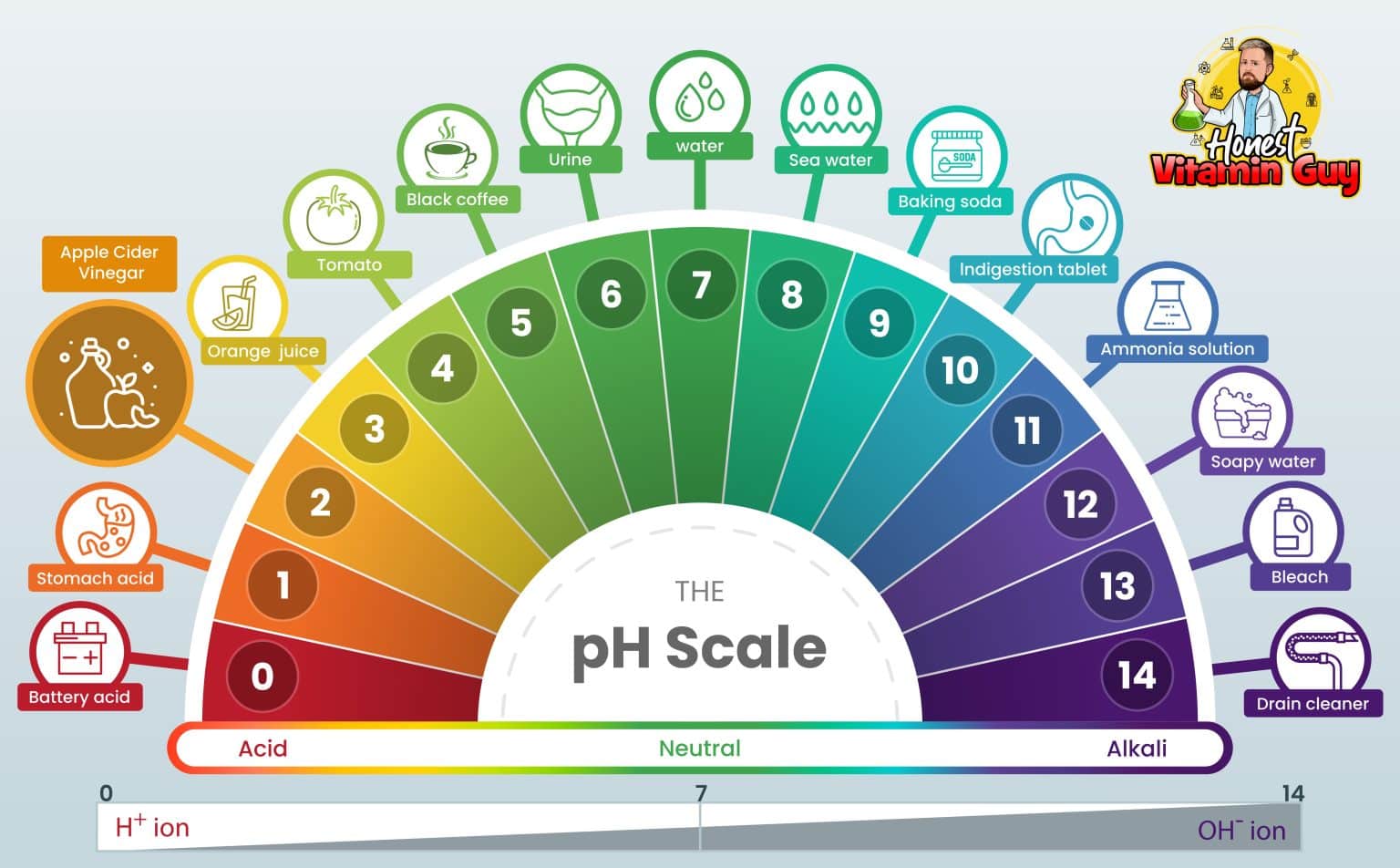Apple Cider Vinegar And Alkalinity: The Ultimate Guide To Boost Your Health
Hey there, health enthusiasts! If you’ve been scrolling through wellness blogs or chatting with your gym buddies, chances are you’ve heard about apple cider vinegar and its magical properties. But wait—did someone mention alkalinity? Yup, that’s right! Apple cider vinegar (ACV) and alkalinity are two terms that are often tossed around together, and today, we’re diving deep into why this combo matters for your health. Whether you’re a skeptic or a die-hard fan of natural remedies, this article is here to spill the tea—or should I say, the vinegar?
Now, before we get all sciency, let’s talk about why this topic is so important. ACV isn’t just some random ingredient in your kitchen cabinet; it’s a powerhouse that people swear by for everything from weight loss to digestion. But here’s the twist—when it comes to alkalinity, things can get a bit confusing. Is ACV acidic or alkaline? Does it really balance your pH levels? These are the questions we’ll be answering today, and trust me, you’re gonna want to stick around for this.
So, grab your favorite mug of tea (or a shot of ACV if you’re feeling bold), and let’s break down everything you need to know about apple cider vinegar and alkalinity. Spoiler alert: Your health goals might just get a little easier to achieve after this!
Read also:Alice Rosenblum Leaked Videos The Untold Story And What You Need To Know
What is Apple Cider Vinegar Anyway?
Alright, let’s start with the basics. Apple cider vinegar, or ACV for short, is basically fermented apple juice. Sounds simple, right? But don’t be fooled by its humble origins. This tangy liquid is packed with acetic acid, antioxidants, and a host of other goodies that make it a favorite among health enthusiasts. It’s been used for centuries for everything from cleaning to cooking, but today, we’re focusing on its health benefits.
Here’s the fun part: ACV is acidic, but here’s the kicker—it can have an alkalizing effect on your body. Confusing, right? Don’t worry, we’ll dive deeper into that later. For now, just know that this vinegar isn’t just another kitchen staple—it’s a potential game-changer for your health journey.
How is Apple Cider Vinegar Made?
Ever wondered how ACV gets its superpowers? It all starts with crushed apples that are fermented into alcohol (yes, like cider!). Then, bacteria and yeast come into play, turning the alcohol into acetic acid. This process gives ACV its signature tangy flavor and its health-boosting properties. And if you’re into organic stuff, you’ll love the fact that raw, unfiltered ACV contains something called the “mother,” which is a web-like substance filled with enzymes and probiotics.
The Alkalinity Buzz: What’s All the Hype About?
Now that we’ve covered what ACV is, let’s talk about alkalinity. You’ve probably heard of the alkaline diet or pH balance, but what does it all mean? Simply put, alkalinity refers to the level of alkaline substances in your body. Your body has a delicate pH balance, and while it’s naturally slightly alkaline, modern diets can throw that balance off.
Here’s the deal: Many of the foods we eat, like processed snacks and sugary drinks, are acidic. Over time, this can lead to inflammation, fatigue, and other health issues. That’s where alkalinity comes in. By incorporating more alkaline foods into your diet, you can help restore balance and support overall wellness. And guess what? Apple cider vinegar might just be your secret weapon in this battle.
What Happens When Your Body is Too Acidic?
When your body’s pH levels are too acidic, things can get messy. You might experience symptoms like:
Read also:Rancho El Grande Photos A Stunning Glimpse Into Natures Paradise
- Chronic fatigue
- Joint pain
- Weakened immune system
- Weight gain
Sound familiar? If you’re nodding your head, it might be time to consider incorporating more alkaline foods into your diet. And yes, ACV could be a great place to start.
Can Apple Cider Vinegar Really Balance Your pH Levels?
This is where things get interesting. Despite being acidic in nature, apple cider vinegar can actually have an alkalizing effect on your body. Crazy, right? Here’s how it works: When you consume ACV, your body metabolizes it into alkaline compounds. This means that even though it tastes acidic, it can help neutralize excess acid in your system and promote a healthier pH balance.
But don’t just take my word for it. Studies have shown that ACV can improve digestion, reduce inflammation, and even support weight loss—all of which are linked to maintaining a balanced pH level. So, if you’re looking for a natural way to support your body’s alkalinity, ACV might just be the answer.
How Much Apple Cider Vinegar Should You Consume?
Now, here’s the million-dollar question: How much ACV should you be drinking? Most experts recommend starting with 1-2 teaspoons mixed with water per day. If you’re new to ACV, start slow and see how your body reacts. And remember, it’s always a good idea to dilute it with water to protect your tooth enamel.
Health Benefits of Apple Cider Vinegar
Besides its alkalizing properties, ACV comes with a whole host of other health benefits. Here are just a few reasons why this vinegar deserves a spot in your daily routine:
1. Supports Digestion
ACV is a digestion superhero. It contains enzymes that can help break down food more efficiently, reducing bloating and discomfort. Plus, its probiotic properties can support gut health and promote a healthy microbiome.
2. Boosts Weight Loss
Looking to shed a few pounds? ACV might be able to help. Studies have shown that it can increase feelings of fullness, reduce calorie intake, and even boost metabolism. Pair it with a balanced diet and regular exercise for best results.
3. Lowers Blood Sugar Levels
For those with diabetes or insulin resistance, ACV can be a game-changer. It has been shown to improve insulin sensitivity and lower blood sugar levels after meals. Just be sure to consult your doctor before making any changes to your diet.
Myths vs. Facts: Debunking the ACV Hype
With so much information floating around, it’s easy to get caught up in the hype. But let’s separate fact from fiction when it comes to apple cider vinegar and alkalinity.
Myth: ACV is a Cure-All
Fact: While ACV has many health benefits, it’s not a miracle cure. It should be part of a balanced diet and healthy lifestyle, not a replacement for medical treatment.
Myth: You Can Drink ACV Straight
Fact: Drinking undiluted ACV can damage your tooth enamel and irritate your throat. Always mix it with water or another liquid before consuming.
How to Incorporate Apple Cider Vinegar into Your Diet
Ready to give ACV a try? Here are some easy ways to incorporate it into your daily routine:
- Add it to salad dressings for a tangy kick.
- Mix it with water and honey for a refreshing drink.
- Use it as a natural marinade for meats and veggies.
- Try it in smoothies for an extra boost of nutrients.
Recipes to Try
Need some inspiration? Here’s a simple recipe to get you started:
- 1 tablespoon ACV
- 1 tablespoon honey
- 8 ounces of water
Stir it all together and enjoy a delicious and healthy drink!
Expert Insights: What the Science Says
Let’s dive into the science behind ACV and alkalinity. According to a study published in the Journal of Diabetes Research, ACV can improve insulin sensitivity and reduce blood sugar levels. Another study found that it can support weight loss by increasing feelings of fullness and reducing calorie intake.
But what about alkalinity? While more research is needed, many experts believe that ACV’s alkalizing effect can help reduce inflammation and promote overall wellness. So, while it’s not a magic pill, it’s definitely worth considering as part of a healthy lifestyle.
Where to Find Reliable Information
When it comes to health advice, it’s important to stick to reputable sources. Some great places to start include:
- PubMed
- Mayo Clinic
- Harvard Health Publishing
Conclusion: Is Apple Cider Vinegar Worth the Hype?
So, there you have it—everything you need to know about apple cider vinegar and alkalinity. While ACV isn’t a miracle cure, it’s definitely a powerful tool in your health arsenal. From supporting digestion to balancing pH levels, this tangy liquid has a lot to offer.
Ready to give it a try? Start small, listen to your body, and don’t forget to mix it with water to protect your teeth. And if you’ve got any questions or tips, drop them in the comments below. Let’s chat about all things ACV and alkalinity!
Table of Contents
- What is Apple Cider Vinegar Anyway?
- The Alkalinity Buzz: What’s All the Hype About?
- Can Apple Cider Vinegar Really Balance Your pH Levels?
- Health Benefits of Apple Cider Vinegar
- Myths vs. Facts: Debunking the ACV Hype
- How to Incorporate Apple Cider Vinegar into Your Diet
- Expert Insights: What the Science Says
- Recipes to Try
- Where to Find Reliable Information
- Conclusion: Is Apple Cider Vinegar Worth the Hype?


